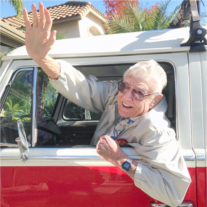Norwood C. Horne
May 26, 1921 - August 19, 2016
- Share:
Norwood C. Horne
May 26, 1921 - August 19, 2016
Obituary
NORWOOD CASWELL HORNE
May 26, 1921 – August 19, 2016
Norwood Caswell Horne was born in the very small North Carolina town of Magnolia. In his teens he worked summers driving trucks along the east coast, setting up pins at a bowling alley, and lifeguarding at Wrightsville Beach, NC. He later attended North Carolina State University for 1 year to play basketball for the Wolfpack.
World War II broke out in September of 1939. Norwood joined the Navy in September of 1941 and was chosen for immediate sea duty, assigned to the Destroyer, Jesse Roper. Three months later, when the U.S. joined the war following the attack on Pearl Harbor, Norwood and his Roper shipmates saw considerable action. The Roper sank a German U-boat off the coast of North Carolina; was hit by a kamikaze plane; picked up survivors of sinking ships; and transported many foreign troops.
While in the service he traveled the world, going to Okinawa, Newfoundland, the Caribbean, the Mediterranean, Europe, the Panama Canal and both US coastlines. He received an honorable discharge in October of 1945 after receiving two battle stars for the European-African-Middle East campaign, one battle star for the American campaign, another battle star for the Asiatic-Pacific campaign and a World War II Victory medal. He loved his time in the Navy and it was a highlight in his life.
In 1946 he began taking flying lessons and in September went to Tulsa, Oklahoma to attend Spartan Aeronautical Engineering School. He loved to fly, so he took flying lessons and logged as many hours as possible. In 1948 he spent some time as a roustabout working in the oil fields, until he was eventually hired in 1949 by United Airlines. He began as a Flight Engineer in New York flying on DC-6 airplanes.
Norwood was a young, eligible bachelor in New York until he met a pretty stewardess named Betty Jean Long. They were married in November of 1950 and the newlyweds enjoyed the clubs in New York featuring the Big Bands and Dixieland Jazz. In 1953 their daughter Betty Louise was born. Norwood, Betty Jean and Betty Louise moved to Southern California in 1955 and shortly after their daughter Carol Ann was born in January of 1956. Six years later, in 1962, their son John Norwood was born. Norwood, a man of many talents, helped build his dream custom home in Costa Mesa in 1965. Norwood and Betty Jean, or BJ as she was known, loved to travel and over their lifetime together they made many trips across country and to more remote destinations like Hawaii, Europe, Mexico, Cuba, Canada, South America, and Japan.
In May of 1981 Norwood retired from United Airlines after 32 years of flying. Norwood and BJ moved to Oceanside in 1984, but Norwood got bored in retirement. To fight the tedium of retirement, Norwood transported RV’s across country and started building four townhouses on his property in Carolina Beach, NC. He and BJ continued to travel across country and occasionally to Europe.
In 2000 Norwood and BJ moved into Freedom Village to help care for BJ who was in the early stages of Alzheimer’s. In December of 2001 Norwood was baptized at Saddleback Church where he worshiped weekly for the next 15 years. Norwood read the Bible from cover to cover four times! On January 3, 2002, Betty Jean passed away. Norwood continued to travel on his own for a while, and later with family. He loved North Carolina and Florida, and was always ready to pack his bag and take a trip anywhere.
Norwood’s favorite Bible verse
Luke 1:37
Nothing is impossible with God.


7 responses to Norwood C. Horne
Louise Horne says:
September 8, 2016
I’m Lou Horne, Norwood’s daughter. I thought I would post the eulogy I delivered here. This is the draft form. When I gave the eulogy, I did some editing, and made a couple of additions.
We are here to remember Norwood Horne, my father. He had a long and event-filled life, and a peaceful passing. We can celebrate him without regret.
Born in 1921, he was a small town boy from Magnolia, North Carolina, a bunch of houses and farms clustered around a small railroad depot. He had family in the houses on all sides of him, stern grandparents and watchful aunts and uncles. During the Depression years, he also had some of his schoolteachers boarding in his house and sleeping in the parlor. Perhaps all of this oversight was what, from an early age, inclined him to strike out for other places.
He did, however return like a homing pigeon to Magnolia at regular intervals. He was quite pleased that his name, Norwood Caswell, shared its initials with “North Carolina”.
His grandfather put him to work when he was about 11, sending him out to help pick berries and work in the canna lily fields that surrounded the town. But when he reached his teens, he started his travels, heading to the beach to work during the summers. He worked at a drink stand, he set pins in a bowling alley. He slept where he worked and sometimes got his meals with the job.
He went to college for about a year an unsuccessful venture in the short term, because he did not make the basketball team as he had hoped he would, but in the long term, this period had a big payoff, because it was here that he took an aeronautical engineering course that set him on the career path he later followed through the rest of his working life.
But first he went to war. In September 1941 he enlisted. He was immediately accepted. He had hoped to pursue his involvement with aircraft, but unfortunately the Navy had ships ready to be manned and the situation in Europe was looking ominous, so his 12 week boot camp course was shortened to six weeks and he was sent to sea.
He spent most of the war on a destroyer – the Jesse Roper 316 feet long and 30 feet across at its widest point. She was fast she could get up to 30 knots but that made for a very rough ride in heavy seas. And the ship was crowded and hot, with 30 men in each sleeping compartment, with bunks stacked 3 high and folded against the wall when not in use. There was one shower stall for 100 enlisted men. Dad’s duties were as a deck hand, a loader for the 3″/50 mm guns and as a radio operator. Morse code and flag signals remained with him for years afterward. But what has stayed with all of us longer also came out of his work in the radio room.
It was there that the men typed out the messages they received on military typewriters which typed in all capital letters, to be taken to the communications officer, who deciphered them and passed them up to the Captain. Dad found another use for the military typewriters. He produced a journal of sorts a couple of phrases, about what had impressed him each day. What it comes down to is that our father was tweeting long long before there was twitter. So we have entries from shipboard like:
TOOK OFFICERS AND ENLISTED MEN ABOARD FOR PLEASURE CRUISE MANY SEA SICK
COCA COLA EASTER SUNDAY
PASSENGER DIES AT SEA AFTER APPENDICS OERATION – FUNERAL THE SAME DAY
25 BACK IN PORTO VECCHIO AFTER SECRET MANOVERS (DECOY INVASION OF ITALY MAINLAND)
RED CROSS DO-NUT GIRL COMES ABOARD
BEER PARTY BUT THE VENO DID THE DAMAGE
And, the beginning of a life-long love for southern France:
LIBERTY IN MARSAILLES MUCHO GOOD LIBERTY BEAUCOUP ATTRACTIVE DAMES BEER IS OK TOO
We were fortunate that the war ended when it did, because early in 1945 Dad had requested and been approved for a transfer to submarine duty – he told them on his application that he wanted a change.
(Part 1 of 2)